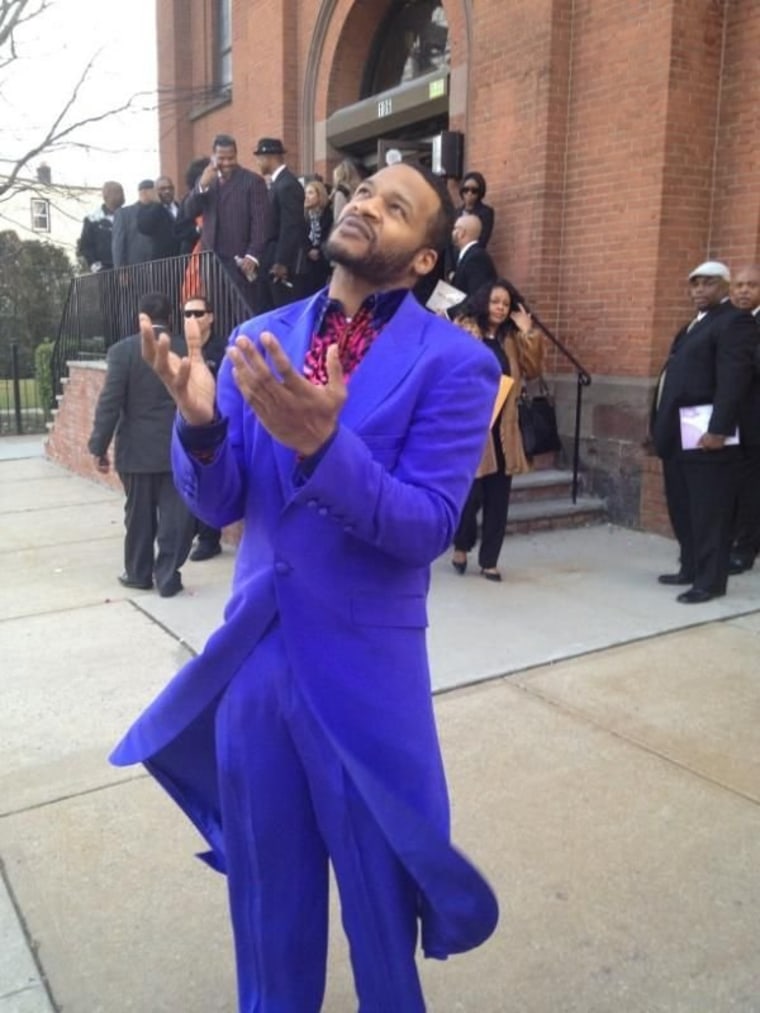So here’s a hilarious Twitter meme most white people totally missed: R&B singer Jaheim’s hideous purple suit. Which he wore for the solemn occasion of crashing Whitney Houston’s funeral, where he had a photo shoot.
"YO SUIT LOOK LIKE THE INSIDE OF A VAMPIRE PURSE MATERIAL," and "Jaheim wanna be grape jelly so bad," are just a few of the gut-busting tweets hurled at and about this dude, whom Kimberly C. Ellis, Ph.D., confirms that most white people have never heard of. When it comes to the R&B music that white people do listen to, "Jaheim hasn’t yet crossed over."

The crazy viral Twitter response to Jaheim’s “zoot suiting up and stunting” Houston’s funeral is one example of the "Bombastic Brilliance of Black Twitter" that Ellis presented during her talk at South by Southwest on Friday. Approximately 26,000 Twitter users participated in the virtual roast, tweeting and retweeting on a topic that didn’t even require a hashtag to keep it bouncing around.
Jaheim's own responses — with misspelled, not infrequently homophobic, vitriol — only inspired more taunts. It was a fashion and etiquette fail more worthy of mainstream lampooning than, say, Angelina Jolie’s leg. That Jaheim’s suit isn’t mocked everywhere illustrates Ellis’s point: the mainstream just does not get black Twitter. Or know about it.
Ellis is an author, performer and educator who has branded herself "Dr. Goddess." She pointed to a 2010 Slate story, "How Black People Use Twitter," in order to illustrate how the dominant black demographic on Twitter gets diminished by the mainstream’s focus on "midnight hashtags." These hashtags are silly and offensive (if you’re not in on the joke, i.e. not black). Topics such as #ifsantawasblack and #ghettobabynames, which serve as call-and-response games, are largely the domain of teenagers.
Ellis quoted @InnyVinny’s viral blog response to the Slate piece: “Black Twitter isn’t a monolith." If you’re trying to sell something, dismissing black Twitter as nothing more than funny hashtags is to discount a valuable and dynamic demographic. It could be marketing suicide.
As of May 2011, 25 percent of African-Americans who are online used Twitter, compared with nine percent of whites, according to the Pew Internet and American Life Project. What’s more, one in ten African-American Internet users visited Twitter every day. That's twice more than Latinos and four times more than whites.

Ever tweet about programs while you're watching TV? Black Twitter had a hand in upgrading the programing on BET, because the network tracked commentary on the microblogging service, Ellis pointed out. The masses' rapier wit aimed at Jaheim also trashed the poor programing offered on that channel, continuing where Aaron MacGruder's "Boondocks" comic strip left off. There's still a way to go, but network execs paid attention.
Ellis wants black Twitter to flex its consumer muscle at corporations so that they will better serve the African-American community. She described one tweet that asked why McDonald’s commercials frequently depict black people dancing. "Why black people always be dancing for their food in McDonald's commercials?" Commercials featuring white customers, you may have but probably have not noted, are relatively lethargic and free of syncopated beats.
Ellis uses the Twitter petition site act.ly in order to influence trending topics. You can send a prewritten tweet via the site, or personalize it before you send it to the Twitterverse. Some of Elllis’ act.ly petitions include an attempt to convince "The Help" author Kathryn Stockett to pay the “real Abilene” $75,000 for which she sued. (Since the film grossed $206 million, it's a fair bet that Stockett can spare the cash.)
In her crusade to educate and elevate, Ellis has her work cut out for her. As the Q&A section of the “Bombastic Brilliance” discussion wound down, a twentysomething woman asked Ellis to elaborate about “the pony.”
"The pony?"
"Yes. The pony."
There was an awkward communal silence.
Then everyone (except the questioner) realized what the young woman was attempting to reference.
Earlier in her talk Ellis discussed not equines, but Kony, as in the warlord Joseph Kony, leader of the Lord's Resistance Army in Uganda, who became known to the world on Monday due to “Kony 2012,” a controversial video burning up the Internet, itself a convoluted story not yet fully understood.
There wasn’t time to explain the distinction to the underinformed inquirer, but there you go. It’s easy to mishear, misinterpret and simply not pay attention.
Helen A.S. Popkin goes blah blah blah about the Internet. Tell her to get a real job on Twitterand/or Facebook. Also, Google+.
More stories about life on the Internet from msnbc.com: